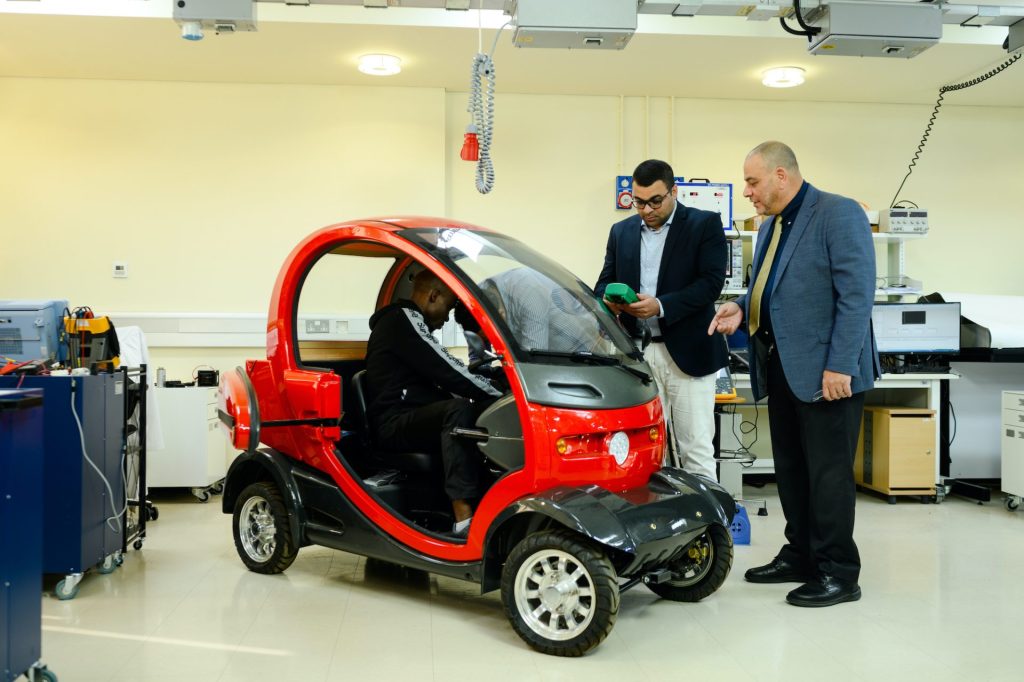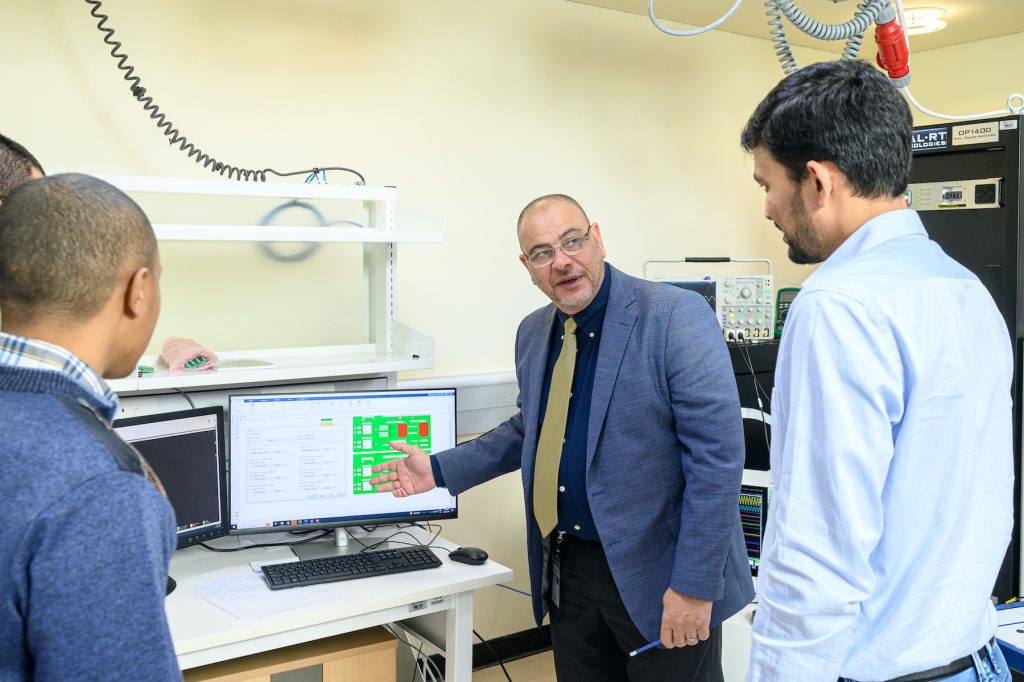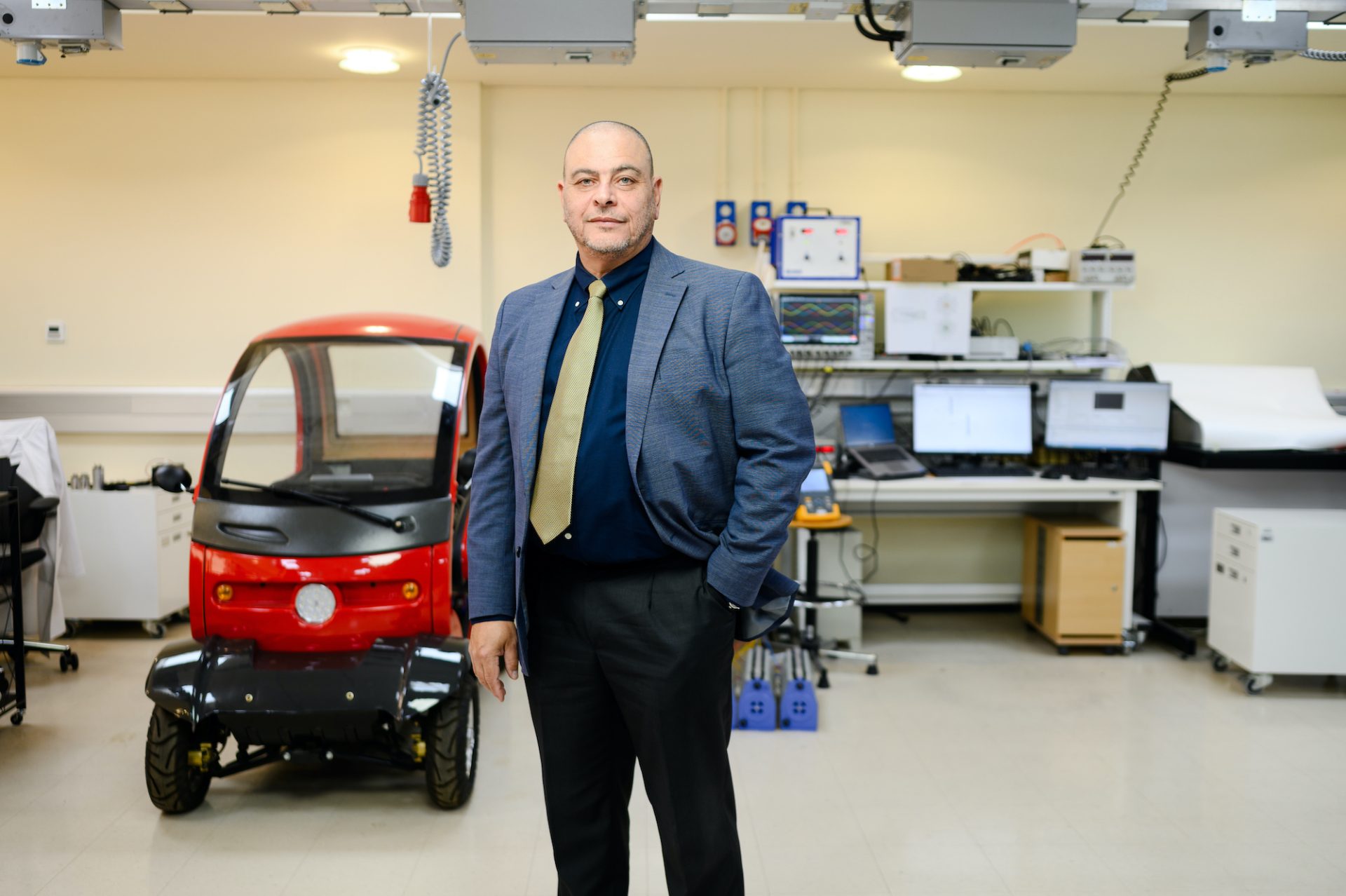Future energy systems with renewable energy integration and transportation electrification
Pioneering research and innovation, the Advanced Power and Energy Center aims to craft the future of electric power and energy systems for seamless integration of high-capacity renewable and non-renewable energy resources.
Focusing on modernizing power grids using emerging new technologies, Khalifa University is paving the way for the development of innovative research that includes renewable energy integration, smart grids, microgrid, transportation electrification and AI applications on hybrid AC/DC power grids.
The global shift to non-fossil-fuel-based energy sources for power generation is critical but poses multiple challenges. It will require major investment in infrastructure and cutting-edge technology, which comes at considerable logistical and financial cost.
Despite the presence of abundant renewable energy sources such as solar and wind, they are intermittent. This results not only in energy supply fluctuations over time, but also poses a significant threat to network stability.
In line with the United Arab Emirates’ commitment to renewable energy integration, Khalifa University set up the Advanced Power and Energy Center (APEC) in 2018 to focus on developing the next generation of electrical energy systems. These systems enable seamless and cost-effective operation of electrical power resources, including renewables and nuclear power generation, supporting hybrid electrical power grids, and providing optimal architectures for smart grids and transportation electrification, says Prof. Ehab El-Saadany, Dean of the College of Engineering and Physical Sciences and the founding Director of APEC.

Focusing on emerging grid-related technologies, the APEC mentors and trains students to become qualified researchers and engineers. By combining academic and industrial expertise with state-of-the-art facilities, APEC turns findings into applications benefiting the economy and society.
“Inspiring and motivating the team to achieve innovative and impactful results requires effective leadership, a supportive work environment, and a clear sense of purpose,” says El-Saadany, who has more than 35 years of academic experience in energy systems, particularly in renewable energy integration and smart grids, as well as 25 years of teaching, mentorship, and leadership experience.
Advancing emerging grid-related technologies
Research at APEC involves all aspects of power systems, encompassing the integration of renewable energy resources, energy storage systems, and the power grid to electrifying transportation.
Road transport, which today relies heavily on fossil fuels, accounts for nearly 75% of total transportation energy consumption worldwide. Electric vehicles (EVs) have emerged as a solution to reduce fossil-fuel dependence and related carbon footprint. Researchers are continually developing methods to innovate infrastructure planning, drive-train design, smart-charging protocols, DC fast chargers and wireless chargers along with enhancing the efficiency of EVs’ energy management systems. Transportation electrification has also affected key vehicle features, such as battery technology, motor technology and the power system, prompting researchers to adapt to these changes.
One of APEC’s founding members, Jamal Alsawalhi, works on improving the powertrain systems that convert electrical into mechanical power to drive the vehicle’s wheels. “Building a motor involves numerous complex factors. Our goal is to ensure the design is efficient, reliable, and power-dense,” he says.
Powertrain systems for electric trucks, ships, and aircraft demand high-power drives. APEC researchers conceived a cost-effective, robust, and simple motor configuration called the three-phase open-end winding induction motor. The configuration requires lower voltage and maintains high performance. Moreover, the researchers have worked out a technique to simultaneously control power and charge that enhances EV performance while extending battery lifetime.
“APEC stands as a pioneering hub of scientific exploration and innovation focused on energy production, distribution and utilization, with a firm commitment to environmental concerns.”
Prof. Ehab El Saadany
Alsawalhi’s group is also exploring methods to wirelessly charge EVs, inspired by techniques used for smartphones. They face some challenges due to the larger batteries used in EVs, which require more power. And unlike a phone that you can simply place on a charger, there is space between the vehicle and the ground, leading to misalignment when parking. “We are developing systems that anticipate and tolerate such misalignment,” Alsawalhi explains.
“APEC has been beneficial to me as a junior faculty, significantly aiding the progress of my research. The laboratory equipment available here is particularly valuable, as it facilitates a wide range of experiments and simulations,” adds Alsawalhi, whose research has relied on the well-equipped power electronics lab, one of the three main facilities that allow researchers to perform their entire project in-house; from computer-aided design and prototype production to validation and testing.
A people-centered approach to building smart cities
APEC envisions a future of sustainable, smart cities equipped with autonomous vehicles and efficient public transport powered by renewable energy sources. The intricate planning and development of such cities requires intelligent energy management and close coordination between power and transportation networks.
“Building a motor involves numerous complex factors. Our goal is to ensure the design is efficient, reliable, and power-dense.”
Jamal Alsawalhi
“These initiatives encompass a spectrum of elements, such as energy-efficient infrastructure, intelligent transportation systems, and AI-driven services that collectively contribute to a more interconnected and efficient society,” says Ameena Al Sumaiti, who believes that energy, transport and artificial intelligence are instrumental for economic growth.

Instead of focusing on individual technologies, APEC has developed a comprehensive people-centered approach that integrates these elements to solve energy and sustainability challenges in smart cities. Technological advancements are crucial but need to enhance people’s lives, promote accessibility and prioritize environmental sustainability, according to Al Sumaiti.
The researchers are currently investigating AI-based energy monitoring for smart homes, autonomous driving planning in mixed-vehicle environments, and enhancing cybersecurity resilience in energy-transport networks.
Bringing power to the world
The center actively fosters knowledge exchange through national and international workshops, symposiums, and conferences, including the IEEE Power & Energy Society’s Innovative Smart Grid Technology conference, for academia and industry.
Collaboration between researchers, industry partners and government agencies is vital, El-Saadany says. “It can bring diverse perspectives, resources and expertise to the table, leading to innovative solutions and practical outcomes.” The team has worked with governmental institutions and major industrial entities in the country, such as the Abu Dhabi Transmission and Dispatch Company and the Dubai Electricity and Water Authority and collaborates with international companies specializing in complex power systems, including Manitoba Hydro International and Elia Grid International.
Ongoing collaborative projects with international institutions include work on smart grids with the University of Waterloo, protection algorithms for distributed energy resources with the University of Toronto, and control strategies for inverter-based distributed generation systems with the University of Alberta.




